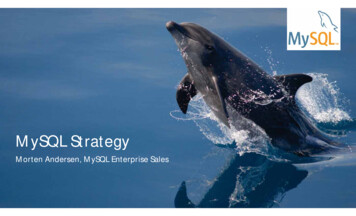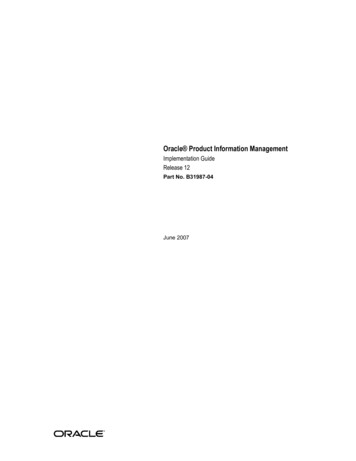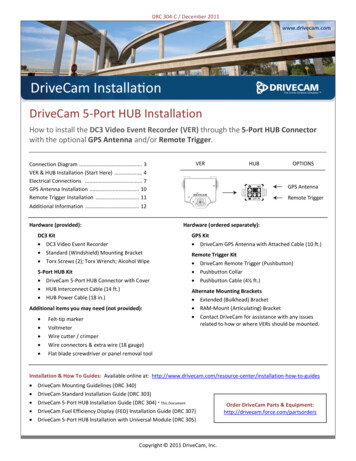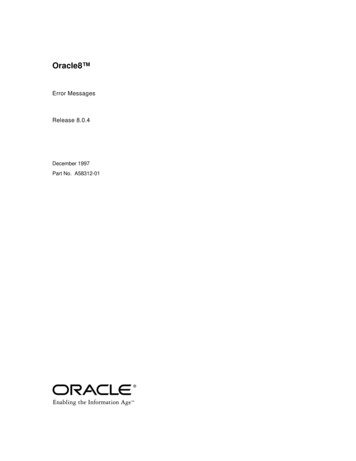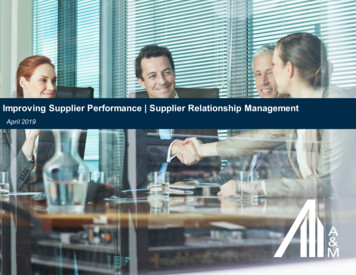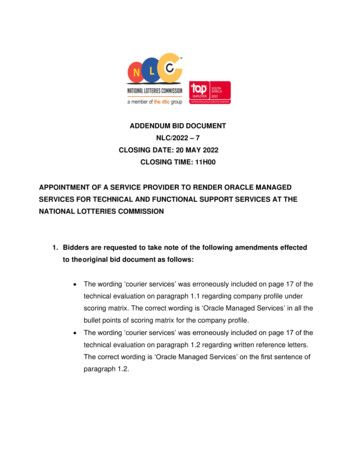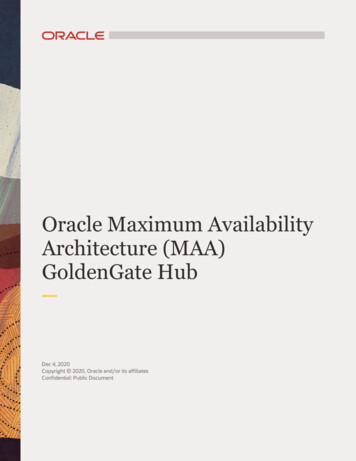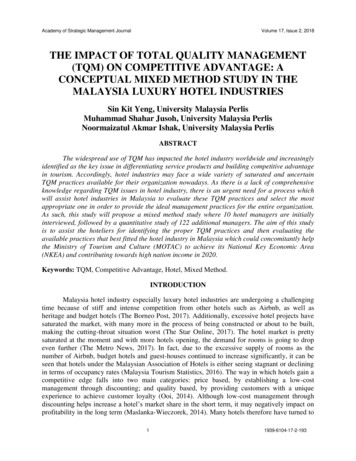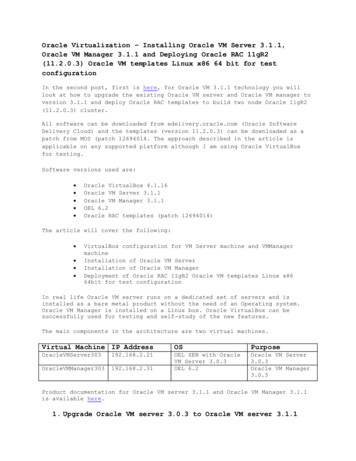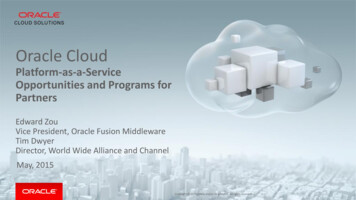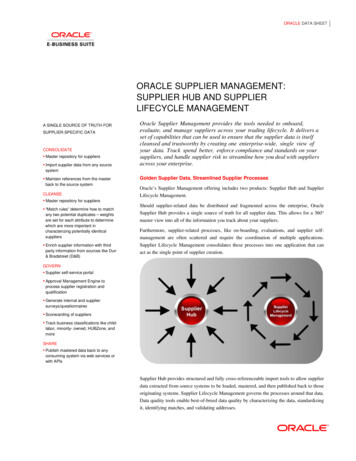
Transcription
ORACLE DATA SHEETORACLE SUPPLIER MANAGEMENT:SUPPLIER HUB AND SUPPLIERLIFECYCLE MANAGEMENTA SINGLE SOURCE OF TRUTH FORSUPPLIER-SPECIFIC DATACONSOLIDATE Master repository for suppliers Import supplier data from any sourceOracle Supplier Management provides the tools needed to onboard,evaluate, and manage suppliers across your trading lifecycle. It delivers aset of capabilities that can be used to ensure that the supplier data is itselfcleansed and trustworthy by creating one enterprise-wide, single view ofyour data. Track spend better, enforce compliance and standards on yoursuppliers, and handle supplier risk to streamline how you deal with suppliersacross your enterprise.system Maintain references from the masterback to the source systemCLEANSE Master repository for suppliers “Match rules” determine how to matchany two potential duplicates – weightsare set for each attribute to determinewhich are more important incharacterizing potentially identicalsuppliers Enrich supplier information with thirdparty information from sources like Dun& Bradstreet (D&B)Golden Supplier Data, Streamlined Supplier ProcessesOracle’s Supplier Management offering includes two products: Supplier Hub and SupplierLifecycle Management.Should supplier-related data be distributed and fragmented across the enterprise, OracleSupplier Hub provides a single source of truth for all supplier data. This allows for a 360 master view into all of the information you track about your suppliers.Furthermore, supplier-related processes, like on-boarding, evaluations, and supplier selfmanagement are often scattered and require the coordination of multiple applications.Supplier Lifecycle Management consolidates these processes into one application that canact as the single point of supplier creation.GOVERN Supplier self-service portal Approval Management Engine toprocess supplier registration andqualification Generate internal and suppliersurveys/questionnaires Scorecarding of suppliers Track business classifications like child-labor, minority- owned, HUBZone, andmoreSHARE Publish mastered data back to anyconsuming system via web services orwith APIsSupplier Hub provides structured and fully cross-referenceable import tools to allow supplierdata extracted from source systems to be loaded, mastered, and then published back to thoseoriginating systems. Supplier Lifecycle Management governs the processes around that data.Data quality tools enable best-of-breed data quality by characterizing the data, standardizingit, identifying matches, and validating addresses.
ORACLE DATA SHEETKEY BENEFITS Track and optimize enterprise spend Manage supplier information in the moststreamlined way Enforce compliance with corporate andgovernment regulationsOracle Supplier Management offers a centralized platform for managing supplier processesand supplier data. Oracle has leveraged its Trading Community Architecture (TCA) andAdvanced Procurement capabilities to provide a rich data model that includes attributecategories like Organizational details, Products and Services, Business Classifications,Purchasing & invoicing terms and controls, Tax Details, and more. Furthermore, the offeringcaptures hierarchy information that, upon suppliers’ being centralized, exposes relationshipsbetween suppliers that would have otherwise remained undiscovered.Lastly, Oracle Advanced Data Quality offers four different servers to clean up, enrich,standardize, and validate data above and beyond the standard use case. Oracle Advanced DQsupports the existing functionality of the Hub and SLM.Effective Supplier Analysis that Drives Better Decision Making, Risk Management,and Streamlined Supplier Relationship ActivityOracle Supplier Management’s feature set and technical solution translate to tremendousbusiness advantages – chiefly, its enabling of spend tracking and of supplier riskmanagement.Supplier information sits in different procurement systems across different geographies,divisions, and marketplaces. Senior-level management will have a better window intoenterprise-wide spend if all of that information is consolidated into one repository. Simplyput, centralized, clean data creates visibility into spend. Visibility into spend createsopportunities for cost reduction. Once data becomes centralized, decision-makers are betterequipped to see which suppliers cost more and which have been performing better.Furthermore, they can create opportunities by running reports on particular attributes. Forexample, if a user consolidates their data and then sees they have been procuring computermonitors in different regions from 3 different suppliers, they may opt for a sole-sourcecontract with just one of them in order to drive their costs down.Beyond that, Supplier Management enables supplier risk management. According to AMRresearch1, it costs companies between 500 and 1000 to manage each supplier annually.Employing a technology solution can reduce that cost by upwards of 80%. By enablingsuppliers to register their own selves and to edit their own information, not only does thestreamlined process cut costs, but by reducing their barrier to entry into the user’s business,Supplier Management creates opportunities to do business with an expanded set ofsuppliers. Furthermore, buyer administrators mitigate their risk of engaging in business withsuppliers who fail to comply with corporate- or government-set standards when users cantrack that information with a rich data model.2
ORACLE DATA SHEETSupplier Hub is the latest addition to Oracle’s existing MDM footprint. Oracle MDM hasalready released products designed to master customers, products, and sites. Supplier Hubhas extended TCA’s data model to incorporate attributes within Oracle AdvancedProcurement’s supplier model to give the most robust supplier data model on the market.How does it master suppliers? With Supplier Hub, much like with other products in theOracle MDM portfolio, a data steward consolidates records from source systems into themaster, or “Hub”, and removes duplicates by merging the same record that came frommultiple spoke systems while maintaining cross references back to those systems. Using“match rules”, data stewards can determine how sensitively duplicates are automaticallyidentified by setting weights for different attributes. This merging can be done automaticallyif duplicates are deemed similar enough as well, and so long as the match rules areappropriately set, merges are set to occur largely automatically without the need of asteward’s manual work. They can also enrich the data with third party information providedby the likes of D&B and Trillium. These steps ensure that the master record is the singlesource of truth for the entire enterprise. From here, the mastered records can be published toconsuming spoke systems who may want their sense of truth to reflect the master’s source oftruth.Although Supplier Management comes pre-seeded with a rich set of attributes, the businessadministrator might wish to extend the supplier’s profile in order to track additionalattributes. User Defined Attributes (UDAs) allow business administrators to define andcategorize new attributes for every supplier and their sites. Business users can then usepersonalized search criteria to search the master and to view results that include bothstandard and extended attributes. Furthermore, the Supplier Management offerings sit on thesame technology stack as Oracle’s Product Hub. One can master suppliers and items orproducts within the same instance, and even tie products to suppliers through our itemsupplier associations.The Supplier Management solution is buttressed by an optional incorporation of OracleAdvanced Data Quality. Oracle Advanced Data Quality offers advanced capabilities forprofiling data (to determine completeness, consistency, accuracy, etc), parsing andstandardizing data (e.g. “Inc.” becomes “Incorporated”), and address validation.3
ORACLE DATA SHEETSupplier Lifecycle ManagementSupplier Lifecycle Management offers functionality that aids supplier administrators inmanaging their suppliers. Before an administrator on-boards suppliers, they can designate anapproval management flow to assure that the supplier requests are evaluated by specifiedpeople within the organization prior to the suppliers’ approval.RELATED PRODUCTS ANDSOLUTIONS Sourcing iSupplier Portal Product Hub Customer Hub Site Hub Accounts Payable Purchasing Procurement Contracts Oracle Fusion Middleware Oracle Advanced Data Quality OBIA and OBIEE (Analytics)Also, suppliers have the ability to self-register and send requests for approval to the buyerorganization. Furthermore, they can maintain their own information on a rolling basis.Through the supplier-side portal, suppliers can also exchange documents in addition to newprofile, banking, location, and other information. Supplier Hub administrators can specifyhere, too, a flow for checking changes in supplier information, and those changes can beregistered in the master.Furthermore, Supplier Lifecycle Management administrators can generate supplierevaluation questionnaires, send them to internal stakeholders within the organization forsupplier performance review or to suppliers themselves for data gathering, evaluation, orprofile updating.Deployment OptionsRequirements may vary when it comes to choosing a deployment strategy for a suppliermanagement solution. Supplier Management provides two options for deployment within theOracle E-Business Suite environment. Supplier Hub can be installed on an existing EBusiness Suite instance, also known as a “single-instance” deployment, or it can beinstantiated as a “stand-alone” deployment. Supplier Lifecycle Management is installed onan existing EBS Suite instance.(a) Stand-alone Instance Deployment(b) Single- Instance DeploymentOracle E-Business Suite: The Complete SolutionOracle E-Business Suite enables companies to efficiently manage customer processes,manufacture products, ship orders, collect payments, and more—all from applications thatare built on one unified information architecture. This information architecture provides asingle definition of your customers, suppliers, employees, products—all aspects of yourbusiness. Whether you implement one module or the entire Suite, Oracle E-Business Suiteenables you to share unified information across the enterprise so you can make smarterdecisions with better information.4
ORACLE DATA SHEETFor more information about Oracle Customer Hub, visit oracle.com/goto/mdm or call 1.800.ORACLE1 to speak to an Oraclerepresentative.Copyright 2013, Oracle and/or its affiliates. All rights reserved.This document is provided for information purposes only and the contents hereof are subject to change without notice. This document is not warranted to be error-free, nor subjectto any other warranties or conditions, whether expressed orally or implied in law, including implied warranties and conditions of merchantability or fitness for a particular purpose.We specifically disclaim any liability with respect to this document and no contractual obligations are formed either directly or indirectly by this document. This document may notbe reproduced or transmitted in any form or by any means, electronic or mechanical, for any purpose, without our prior written permission.Oracle and Java are registered trademarks of Oracle and/or its affiliates. Other names may be trademarks of their respective owners.Intel and Intel Xeon are trademarks or registered trademarks of Intel Corporation. All SPARC trademarks are used under license and are trademarks or registered trademarks ofSPARC International, Inc. AMD, Opteron, the AMD logo, and the AMD Opteron logo are trademarks or registered trademarks of Advanced Micro Devices. UNIX is a registeredtrademark licensed through X/Open Company, Ltd. 01125
Supplier Lifecycle Management consolidates these processes into one application that can act as the single point of supplier creation. provides structured and fully cross-referenceable import tools to allow supplier data extracted from source systems to be loaded, ma stered, andthen publishedback to those .
